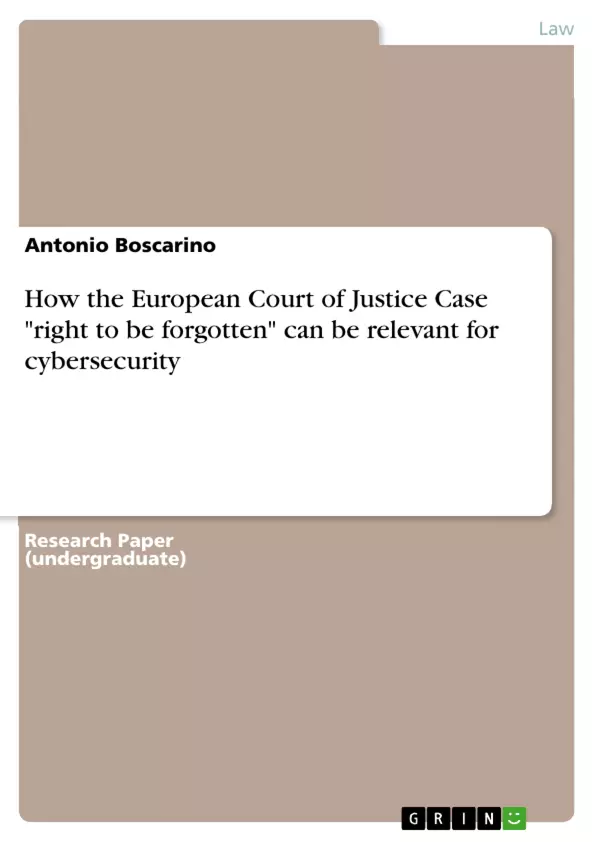The Internet is overwhelmed by personal data, that are massively collected and traded, and it is quite common in our everyday life to hear news concerning cyber-attacks, or generally cyber-threats that, increasingly, have the purpose of violating users’ data. Moreover, States on an international level have shown serious difficulties in creating binding treaties to protect efficiently the data subjects as some recent scandals proved. In fact, with the growing importance and involvement of personal data it will be difficult to think at all the authorities to prevent or to countercheck efficiently the future cyber-threats and so I would like to show in the following chapters how the right to be forgotten might become the crucial factor with which individuals can protect themselves and their rights.
Furthermore, I will try to analyze the right to be forgotten and its relevancy for cybersecurity within three fundamental aspects. Firstly, how EU citizens may use appropriately the right to be forgotten to prevent the harmfulness of cyber-attacks; secondly, which are the limits of this right in order not be itself prejudicial for cyber-security, eventually the tensions among citizens, governments and enterprises in ensuring protection and security.
The right to be forgotten has been analyzed by the European Court of Justice in “Google Spain Case” taking as a reference point the directive 95/46. In the judges’ opinion, Google and the other search engines must be considered as “the controllers” and they have the duty to erase those data that have not any more a public interest that justifies them, and if there is an order laid down by a judge.
In this research I am taking into account some issues of Italian National Law, that can be useful to extend the reasonings analogically to other Countries. Furthermore, to analyze the digital education of the data subjects I am taking as an example Singapore.
Inhaltsverzeichnis (Table of Contents)
- INTRODUCTION
- ELEMENTS OF THE RIGHT TO BE FORGOTTEN
- HOW ARE CITIZENS AWARE OF CYBER-THREATS? A BRIEF ANALYSIS
- THE "HARD" ROLE OF THE RIGHT TO BE FORGOTTEN: CYBERCRIMES
- BALANCING THE RIGHT TO BE FORGOTTEN WITH ITS LIMIT. CONCLUSION
Zielsetzung und Themenschwerpunkte (Objectives and Key Themes)
This research paper explores the relevance of the European Court of Justice's "Right to be Forgotten" case for cybersecurity. It analyzes the potential of this right in protecting individuals from cyber-threats and investigates its limitations and balancing with other legal and societal interests.
- The potential of the "Right to be Forgotten" in safeguarding individual data privacy and security.
- The limitations and balancing of the "Right to be Forgotten" with freedom of expression and information.
- The importance of digital education and awareness in preventing cyber-threats.
- The need for effective international treaties and cooperation to address cybersecurity challenges.
- The role of both governments and enterprises in protecting individuals from cyber-threats.
Zusammenfassung der Kapitel (Chapter Summaries)
- INTRODUCTION: This chapter introduces the topic of the "Right to be Forgotten" and its potential significance for cybersecurity in the context of growing cyber-threats and challenges to data protection.
- ELEMENTS OF THE RIGHT TO BE FORGOTTEN: This chapter examines the key elements and legal foundations of the "Right to be Forgotten," exploring its scope, limitations, and relationship with other legal principles like freedom of expression.
- HOW ARE CITIZENS AWARE OF CYBER-THREATS? A BRIEF ANALYSIS: This chapter discusses the importance of digital education and awareness in preventing cyber-threats. It provides a brief analysis of a cybersecurity public awareness survey conducted in Singapore.
Schlüsselwörter (Keywords)
The paper focuses on the "Right to be Forgotten," cybersecurity, data protection, digital education, cyber-threats, freedom of expression, information, and the European Court of Justice's "Google Spain" case.
Frequently Asked Questions
What is the "Right to be Forgotten" in the context of the ECJ?
The "Right to be Forgotten" was established by the European Court of Justice in the "Google Spain Case." It allows individuals to request search engines to remove links to personal information that is inaccurate, inadequate, irrelevant, or excessive for the purposes of data processing.
How can the Right to be Forgotten improve cybersecurity?
By allowing individuals to erase data that no longer has a public interest, it reduces the "data footprint" available to cyber-criminals, thereby preventing potential harmfulness of cyber-attacks and identity theft.
What are the limits of the Right to be Forgotten?
The right is not absolute. it must be balanced against other fundamental rights, such as freedom of expression and the public's interest in accessing information. It can also be limited if it prejudices cybersecurity measures of governments or enterprises.
Who is considered a "controller" according to the Google Spain Case?
According to the ECJ judges, search engines like Google are considered "controllers" of personal data because they determine the purposes and means of processing information available on the web.
What role does digital education play in data protection?
Digital education is crucial for awareness. The research uses Singapore as an example to show how a well-educated public can better recognize cyber-threats and proactively use their rights to protect their data.
- Citation du texte
- Antonio Boscarino (Auteur), 2018, How the European Court of Justice Case "right to be forgotten" can be relevant for cybersecurity, Munich, GRIN Verlag, https://www.grin.com/document/431011



